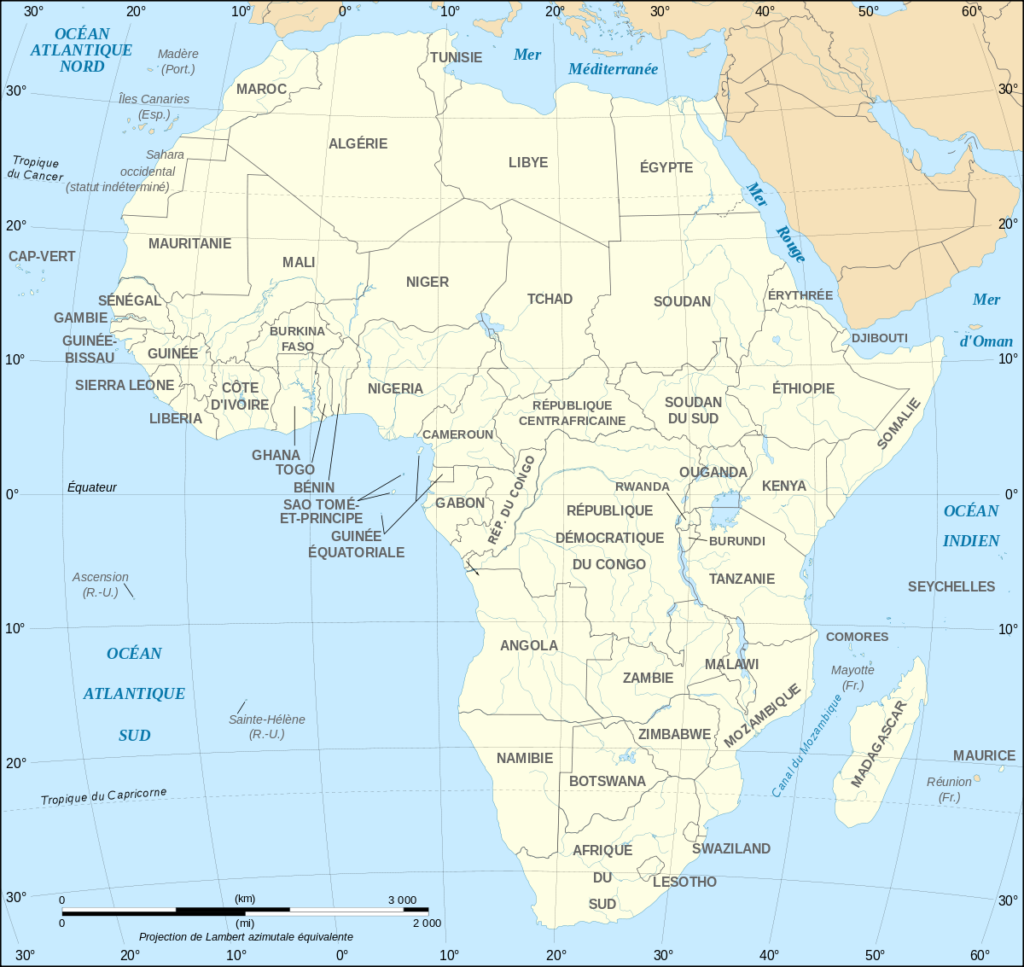
“I am an Africa, not because I was born in Africa but becouse Africa is born in me.” Kwane
Africa is the world’s second-largest and second-most-populous continent. At about 30.3 million km2, including adjacent islands, it covers 6% of Earth’s total surface area and 20% of its land area. With 1.3 billion people as of 2018, it accounts for about 16% of the world’s human population. Africa’s population is the youngest amongst all the continents. Despite a wide range of natural resources, Africa is the least wealthy continent per capita. Africa is considered to be the oldest inhabited territory on Earth, with the human species originating from the continent. During the mid-20th century, anthropologists discovered many fossils and evidence of human occupation perhaps as early as 7 million years ago (BP=before present). Fossil remains of several species of early apelike humans thought to have evolved into modern men.

The ethnic groups of Africa number in the thousands, with each population, generally having its own language (or dialect of a language) and culture. A 2009 genetic clustering study, which genotyped 1327 polymorphic markers in various African populations, identified six ancestral clusters. The clustering corresponded closely with ethnicity, culture and language. A 2018 whole genome sequencing study of the world’s populations observed similar clusters among the populations in Africa. At K=9, distinct ancestral components defined the Afroasiatic-speaking populations inhabiting North Africa and Northeast Africa; the Nilo-Saharan-speaking populations in Northeast Africa and East Africa; the Ari populations in Northeast Africa; the Niger-Congo-speaking populations in West-Central Africa, West Africa, East Africa and Southern Africa; the Pygmy populations in Central Africa; and the Khoisan populations in Southern Africa.
Every culture has its share of wise proverbs or sayings, usually single sentences, passed down from one generation to the next. While these sayings may vary from one language, culture, and country to another, the wisdom they convey is universal. Africa, in particular, is overflowing with inspirational sayings, many of which provide a captivating insight into the rich and vibrant cultures that crafted them. Some of African proverbs:
“Teeth do not see poverty”. Even when circumstances are dire, people still manage to find something to smile about.
”Only a fool tests the depth of a river with both feet”.Don’t leap into a situation without first thinking about the consequences.
”Do not look where you feel, but where you slipped”.Rather than dwelling on your mistake, look at what caused you to make the mistake.
”The best way to eat an elephant in your path is to cut him up into little pieces”.The best way to solve a problem is to tackle it bit by bit, one step at a time.
”He who does not know one thing knows another”.No one can know everything but everyone knows something.
”Rain beats the leopards skin but it does not wash out the spots”.No matter how hard you try, you cannot change another person’s character. Similarly, if you behave badly and develop a poor reputation, it’s difficult to change other people’s opinions of you, regardless of how many good deeds you perform.
”No matter how hot your anger is it cannot cook yams”.While anger can prompt a positive action that may resolve an issue, the act of getting angry resolves nothing.
”A roaring lion kills no game”.Sitting around and talking about something gains nothing. The saying also implies that you should work towards your goals quietly rather than bragging about your achievements prematurely
”Do not call the forest that shelters you a jungle”.Do not disrespect or insult someone who shares your burdens and responsibilities or who takes care of you.
”Rain does not fall on one roof alone”.Trouble does not discriminate. It comes to everyone at some point.
”Ears that do not listen to advice, accompany the head when it is chopped off”.A person who does not heed advice will suffer the consequences.
African art, the visual arts of native Africa, particularly sub-Saharan Africa, including such media as sculpture, painting, pottery, rock art, textiles, masks, personal decoration, and jewelry.
African music is a tradition mainly played at gatherings at special occasions. Music in Africa is very important when it comes to religion. Songs and music are used in rituals and religious ceremonies, to pass down stories from generation to generation, as well as to sing and dance to. African music consists of complex rhythmic patterns, often involving one rhythm played against another to create a polyrhythm. The most common polyrhythm plays three beats on top of two, like a triplet played against straight notes. Beyond the rhythmic nature of the music, African music differs from Western music in that the various parts of the music do not necessarily combine in a harmonious fashion. African musicians aim to express life, in all its aspects, through the medium of sound. Each instrument or part may represent a particular aspect of life, or a different character; the through-line of each instrument/part matters more than how the different instruments and parts fit together. African music does not have a written tradition; there is little or no written music to study or analyze. This makes it almost impossible to notate the music – especially the melodies and harmonies – using the Western staff. There are subtle differences in pitch and intonation that do not easily translate to Western notation. African music most closely adheres to Western tetratonic (four-note), pentatonic (five-note), hexatonic (six-note), and heptatonic (seven-note) scales. Harmonization of the melody is accomplished by singing in parallel thirds, fourths, or fifths. Another distinguishing form of African music is its call-and-response nature: one voice or instrument plays a short melodic phrase, and that phrase is echoed by another voice or instrument. The call-and-response nature extends to the rhythm, where one drum will play a rhythmic pattern, echoed by another drum playing the same pattern. African music is also highly improvised. A core rhythmic pattern is typically played, with drummers then improvising new patterns over the static original patterns.
